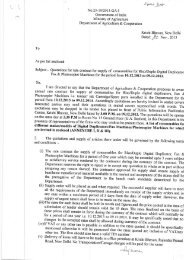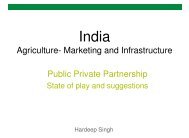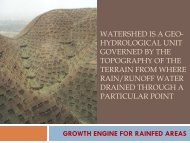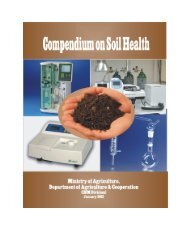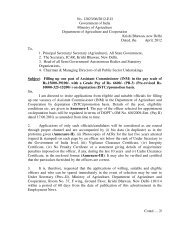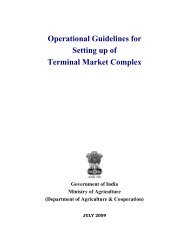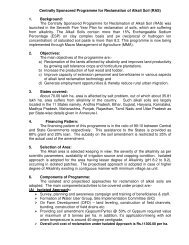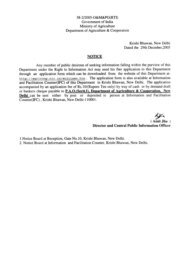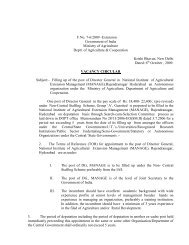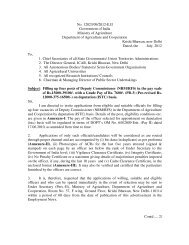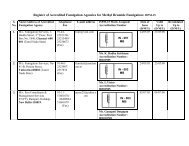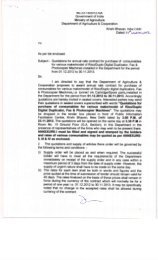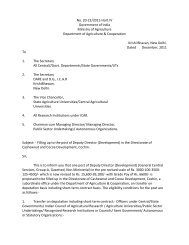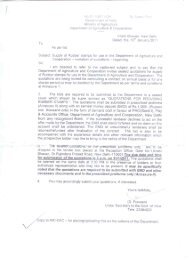Annual Report 2009-2010 - Department of Agriculture & Co-operation
Annual Report 2009-2010 - Department of Agriculture & Co-operation
Annual Report 2009-2010 - Department of Agriculture & Co-operation
Create successful ePaper yourself
Turn your PDF publications into a flip-book with our unique Google optimized e-Paper software.
Farmer-to-farmer extension support at the<br />
village level to be promoted through farmers'<br />
groups.<br />
Funding windows provided at both the state<br />
and district levels for implementing<br />
innovative extension activities not specifically<br />
covered under the cafeteria.<br />
Farmers' awards instituted at the block,<br />
district, and state levels.<br />
<strong>Co</strong>mmunity Radio Stations (CRS) to be set<br />
up by KVKs, SAUs and private organizations<br />
are being promoted under the programme.<br />
For non-governmental implementing<br />
agencies, states have been given the<br />
flexibility <strong>of</strong> having extension work plans<br />
prepared and approved at the state level. A<br />
minimum <strong>of</strong> 10 per cent <strong>of</strong> the programme<br />
outlay is to be utilised through them. Nongovernmental<br />
implementing agencies<br />
(excluding the corporate sector) are also<br />
eligible for service charges <strong>of</strong> up to a<br />
maximum <strong>of</strong> 10 per cent <strong>of</strong> the cost <strong>of</strong> the<br />
extension activities implemented through<br />
them. Apart from other NGOs, financial<br />
assistance is also available for the<br />
implementation <strong>of</strong> extension activities<br />
through agri-preneurs.<br />
Strengthening <strong>of</strong> technical back-up support<br />
by providing more flexibility to states to<br />
engage a maximum <strong>of</strong> six contractual<br />
persons for SAMETI and four contractual<br />
persons for each <strong>of</strong> the ATMA <strong>of</strong>fices with<br />
the provision <strong>of</strong> necessary funds under the<br />
ATMA cafeteria only.<br />
Public extension functionaries being made<br />
more effective through training and exposure<br />
visits. MANAGE, Hyderabad, <strong>of</strong>fers a<br />
postgraduate diploma in <strong>Agriculture</strong><br />
Extension Management for public extension<br />
functionaries, which is fully funded under the<br />
ATMA programme.<br />
9.4 In order to ensure that key reforms under<br />
the scheme are adequately addressed and<br />
promoted, the cafeteria would continue to<br />
specify the following policy parameters within<br />
which the cafeteria would be used:<br />
9.5 Multi-agency extension strategies: A<br />
minimum <strong>of</strong> 10 per cent <strong>of</strong> the allocation on<br />
recurring activities at the district level is to be<br />
used through the non-governmental sector i.e.,<br />
NGOs, Farmers' Organisations (FOs), Panchayati<br />
Raj Institutions (PRIs), para-extension workers,<br />
agri-preneurs, input suppliers, the corporate<br />
sector, etc.<br />
9.6 Farming system approach: The activities<br />
specified in the cafeteria are broad enough to<br />
promote extension delivery consistent with a<br />
farming systems approach and extension needs<br />
emerging through Strategic Research and<br />
Extension Plans (SREP).<br />
9.7 Farmer-centric extension services: The<br />
cafeteria provides for group-based extension and<br />
it has the necessary allocations for activities<br />
related to organising and supporting farmers'<br />
groups. In order to supplement these efforts, a<br />
provision for rewards and incentives to the most<br />
organised farmers' groups has also been provided.<br />
9.8 <strong>Co</strong>nvergence: The SREP and SEWP would<br />
also be mechanisms for ensuring convergence<br />
<strong>of</strong> all activities for extension. At present, resources<br />
for extension activities are being provided under<br />
different schemes <strong>of</strong> Central/state governments.<br />
It is mandatory for the SEWPs submitted by state<br />
governments for funding under the scheme to<br />
explicitly specify the activities to be supported<br />
from the resources <strong>of</strong> other ongoing schemes as<br />
well as from this scheme.<br />
9.9 Mainstreaming gender concerns: It is<br />
mandated that a minimum <strong>of</strong> 30 per cent <strong>of</strong><br />
resources for programmes and activities be<br />
utilised for women farmers. Similarly, 30 per cent<br />
<strong>of</strong> resources meant for extension workers are to<br />
be utilised for women extension functionaries.<br />
9.10 Sustainability <strong>of</strong> extension services: It is<br />
mandated that a minimum 10 per cent<br />
contribution must be obtained from beneficiaries<br />
with respect to beneficiary oriented activities.<br />
9.11 Implementation Status<br />
A total <strong>of</strong> 588 ATMAs have been constituted<br />
in 29 states and two UTs.<br />
Agricultural Extension<br />
51



